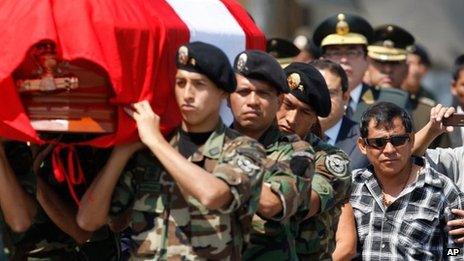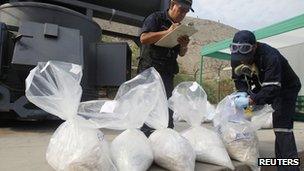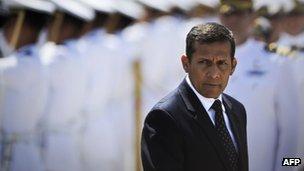Peru faces rethink in fight against Shining Path rebels
- Published

The fate of Dionisio Vilca's son provoked a public outcry in Peru
Dionisio Vilca, a former newsagent, set off earlier this month to search for his son, a 22-year-old policeman who was missing in action in an area of southern Peru where Shining Path rebels operate.
The 53-year-old journeyed for several hours in the jungle with two local guides who said they had spotted the body of his son Cesar.
They found him and brought his body back to base.
Twenty days had passed since Cesar Vilca's unit had come under attack by the rebels close to the Apurimac-Ene valley, or the VRAE, a Shining Path stronghold.
Eight other police officers and soldiers were killed in the rebels' territory.
But it was Mr Vilca's story that touched many Peruvians.
Why had the police abandoned the search for one of their own, they asked, forcing his poor father to find him with his own resources?
Back from the brink?
Such was the public outcry that Peru's interior and defence ministers, responsible respectively for the police and the armed forces, were forced to step down from their posts.
"Without doubt, we are facing a very serious political crisis," says Ruben Vargas, a security analyst who specialises in drug-trafficking and terrorism.
"We can now see with absolute clarity that the government is failing to fight the terrorist group [Shining Path], and that the military and the police in charge of counter-insurgency operations are critically inept."
The Maoist Shining Path rebels posed a major challenge to the Peruvian government in the 1980s and early 1990s, as they wanted to install a communist state.
But they were reduced to smaller armed groups involved in cocaine trafficking, especially in the VRAE.
The drug problem in Peru is serious; the country is close to overtaking Colombia as the top producer of cocaine.
And for that reason Mr Vargas believes the government is underestimating the renewed strength of the rebels.

Peru's challenge is to persuade farmers to stop growing the raw material for cocaine
"The problem of drug-trafficking and terrorism in the VRAE has grown and we can no longer say that these [the rebels] are remnants who pose no security threat, as it was believed not long ago."
President Ollanta Humala recently accepted that parts of the jungle mountainous area were controlled by the rebels.
But Carlos Leon Moya, a political scientist, believes that it would be difficult for the Shining Path to expand their influence beyond the VRAE and the surrounding communities.
"If we compare them to what they used to be 20 years ago, they are definitely weaker," he says.
However, Mr Leon Moya warns that, while not necessarily expanding geographically, the rebels are growing in power and influence.
"In the last five years, the Shining Path have had successes in accomplishing their immediate objectives, which are to maintain control of the routes used to traffic cocaine."
This, he says, is making it difficult for security forces to re-establish a government presence and tackle the drug problem.
"They [the government] are underestimating the seriousness of the problem, saying that they can easily resolve it.
"But they've made too many errors and are losing control of the situation," he says.
Alternative crops
For many security experts, including within the Humala administration, the solution rests with the communities themselves, by persuading them to side with the government and not the rebels.

President Humala has promised to boost the state's presence in remote areas
Ruben Vargas names the San Martin area in the Alto Huallaga region in northern Peru as a good example of a counter-insurgency strategy that worked in the past.
In the 1980s, the area was poor and Peru's main centre of drug-trafficking and rebel activity.
Today, in comparison, after much public and private investment, it is one of the leading producers of cocoa, coffee and palm oil.
But so far in the VRAE, says Mr Vargas, all good intentions have yet to materialise to persuade farmers to switch from coca, the raw material for making cocaine, to cocoa and other alternative cash crops.
"They [the government] talk about projects as if they were already functioning, whereby in reality there's nothing on the ground."
"They have a plan but they've failed to execute it," concurs Carlos Leon Moya. "They lack the ability to do so."
Analysts say that, without a change of strategy, Peru could see further political instability.
If that were to happen, Dionisio Vilca might not be the last father to mourn the death of a son killed in action.
- Published3 May 2012
- Published28 February 2012
- Published23 June 2011
- Published30 April 2012
- Published14 April 2012
- Published11 April 2012
- Published10 April 2012